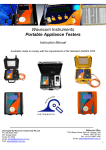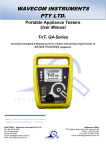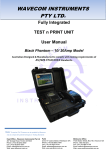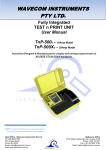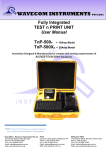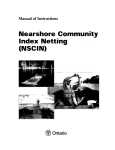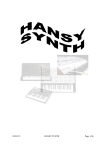Download Wavecom TNT-EL Instruction manual
Transcript
Australian made to comply with the requirements of the Standard AS/NZS 3760 Ph: (08) 8331 8892 Int: (+61) 8 8331 8892 Email: [email protected] www.wavecom.com.au REVISION 1.11 February 2005 Ph: (07) 3274 2466 Int: (+61) 7 3274 2466 Email: [email protected] www.nesco.com.au Accessories Supplied (With the Range of TnT Portable Appliance Testers) • • • • • Portable Appliance Tester Instruction Manual Manufacturers Calibration Certificate IEC Lead Earth Lead with Alligator Clip Soft Carry Case Manufacturers Recommendations (For the Range of TnT Portable Appliance Testers) Calibration: The manufacturer recommends a routine calibration verification of readings for determining the accuracy of readings on a 12 Monthly basis. Page 2 Index Accessories Supplied Manufacturers Reccomendations Index 2 2 3 Safety Warning The TnT Portable Appliance Tester (Diagram) Competent Person Disclaimer & Limited Warranty 4 5 6 6 IMPORTANT INFORMATION: TECHNICAL INFORMATION: Class 1 (Earthed Appliance) Construction Class 2 (D/Insulated) Construction Testing of Electrical Equipment To Change Test Voltage (250/500VDC Select) INTEGRATED TESTS: 7 8 9-10 10 SUPPLY MAINS TEST NCNT TEST 11 12 VISUAL INSPECTION TEST 13 CHAPTER 1 – TnT Portable Appliance Tester Instructions: TnT Test Function Flow Chart EARTHED APPLIANCE TEST DOUBLE INSULATION TEST EXT LEAD TEST 14 15 16 17 CHAPTER 2 - TnT-el Portable Appliance Tester Instructions: TnT-el Test Function Flow Chart TESTS Common to ALL MODELS LEAKAGE TEST 18 19 20-21 CHAPTER 3 – TnT+ Portable Appliance Tester Instructions: TnT+ Test Function Flow Chart TESTS Common to ALL MODELS POWER TEST RCD TEST 22 23 24-25 26-30 Specifications for the TnT, Tnt-el & TnT+ 31 Optional Accessories 32 Other Relevant Authorities 33 FIRST TEST: [Please note: Specific PAT Tests are noted in blue text] Page 3 Safety Warning ! When using any electrical appliance SAFETY must always be observed. Testing appliances is no exception and in fact MORE care must be taken to ensure personal safety is met. Although the TnT range of products has been designed to meet stringent requirements, no person can be completely protected against the consequences of the incorrect use of an electrical device. We advise that appliance testing should be conducted by a competent and suitably trained person. For maximum safety, always ensure that the following advice is followed; • • • • • • The equipment being tested is in good repair. All user instructions are followed. Double check power supply connections (LEDs). Always use specified fuses and protection devices. Do not use leads that require repair or are damaged. If you are unsure, call a Licensed Engineer/Electrician. Page 4 The TnT Portable Appliance Tester (Diagram) Display Test Function F1 These buttons are NOT IN USE & are reserved for future functions Test Function F2 Test Function F3 Return/Enter Button Supply Indicator Lights Power Lead IEC Socket Fuse Device Under Test (DUT) Socket [Diagram shown is a sample only and may not be exact to each specific model of TnT Appliance Tester] Page 5 Competent Person ! To ensure that all electrical equipment or devices that are used to perform specific tasks, are inspected and tested and tagged correctly, regulations require that a competent person such as a Licensed Electrician be employed to perform the required tests. A person competent to undertake Inspection and Testing of electrical equipment must therefore have: 1. 2. 3. 4. 5. Knowledge and practical experience of electricity and its hazards. A clear understanding of precautions to avoid danger. The ability to recognise, at all times, whether it is safe for work to continue or not. The ability to carry out visual examinations of electrical equipment. The ability to distinguish between electrical equipment that is double insulated and equipment that is earthed as well as being able to identify the appropriate test for each type. 6. The competency to carry out the Earthing Continuity, Insulation Resistance or Leakage Test and RCD tests on electrical equipment safely. 7. The knowledge of how to use the relevant testing instruments, interpret and record the results for compliance with the Standard/Workplace requirements. 8. The knowledge to be able to correctly recommend the frequency of testing required. Due to the potential hazards of electrical testing all care must be taken. Disclaimer LIMITED Warranty The Manufacturer warrants its products against defects in materials and workmanship for a period of 12 months from the date of purchase. During the warranty period, the manufacturer will repair (or at its option replace at no charge) the product that proves to be defective. This warranty does not apply if the product has been damaged by accident, abuse, misuse or missapplication or as a result of service or modification by anyone other than Electromate TnT. Electromate TnT product range of devices or its’ manufacturer IS NOT RESPONSIBLE FOR INCIDENTAL OR CONSEQUENTIAL DAMAGES RESULTING FROM THE BREACH OF ANY EXPRESS OR IMPLIED WARRANTY, INCLUDING DAMAGE TO PROPERTY AND TO THE EXTENT PERMITTED BY LAW, DAMAGES FOR PERSONAL INJURY. The Distributors of this product cannot assume liability or responsibility for any loss or damage resulting from the use of this device. Electromate TnT manufacturer reserves the right to discontinue models, change specification, price or design, at any time without notice or obligation. Page 6 Technical Information CLASS 1 (Earthed Appliance) CONSTRUCTION (Single basic insulated and protectively earthed equipment) This type of product design provides two safety barriers between all live conductors at dangerous voltages and the equipment user. The provision of basic insulation between exposed metal parts and live parts is the first barrier to provide basic protection against electric shock. The second safety barrier is by the connection of exposed (accessible) conductive (metal) parts to the protective earthing conductor (earth wire) in the fixed wiring of the device/Installation. The protective earthing terminal of the equipment must be marked with the word "earth" or the symbol "E" or the symbol for Earth Terminal or Protective Conductor Terminal. 1 To perform this test a continuous earth loop must be made between the exposed conductive material (metal) and the TnT appliance tester. This is done by means of connecting the earth lead with the crocodile clip/probe attached to a GOOD earth point (paint & coatings will not provide effective connections) and the DUT (Device Under Test) plugged into the TnT appliance testers’ DUT socket. [as shown in the above picture]. The Maximum allowable limit is 1.0Ω (ohm). Page 7 Technical Information Continued CLASS 2 (Double Insulated) CONSTRUCTION (Double insulated equipment) This method of construction employs two safety barriers comprising two layers of insulation between dangerous voltages and the user of the equipment. The first layer of insulation is formed around the live conductor and is termed ‘the Functional Insulation’. The second layer of insulation is termed ‘the Supplementary Insulation’. In Class II equipment, protection against electric shock does not rely on basic insulation only, but has additional supplementary insulation such as double insulation or reinforced insulation provided, there being no reliance on precautions in the fixed wiring of installation. Class II equipment is marked with the words "DOUBLE INSULATION" or the symbol For double insulated under Safety Symbols: Note 1 – Double Insulation is insulation comprising both basic and supplementary insulation. Note 2 – Reinforced Insulation is a single insulation system with a degree of protection against electric shock, which is equivalent to double insulation. Page 8 1M Technical Information Continued Testing of Electrical Equipment Many testing personnel have some reservations in testing sensitive, electronic equipment using a 500V DC insulation test. There is a perceived fear of causing internal damage from over voltage. With the introduction on the TnT Range of appliance testers, these concerns are alleviated. The TnT Range of electrical portable appliance testers are safe to test electronic equipment as the tests are carried from Active-Neutral (shorted by a relay inside the tester) to Earth. No dangerous voltages pass through in this mode to the internal components of the DUT (Device Under Test). If these tests are done using an Insulation Tester only and the user tests Active to Neutral, this would be a cause of potential damage, this is why the TnT product range is far safer to use. Some changes may be required in certain configurations where fitted surge protection devices (MOV' s) in the DUT may cause a failed test result. Applying 500V in this these situations can cause the surge protection devices to trip, therefore conducting the applied voltage to earth, thus showing a failure of insulation. In these instances the test voltage should be changed to 250V then retest. If DUT still fails, check with the DUT Operators Manual or an electrician. [Refer to page 13 for details - ‘Double Insulation Test’ 250/500VDC to change test voltage]. Under these circumstances, it would be difficult for any damage to occur to either the surge protection device or the DUT, as there is insufficient current generated by the TnT-el appliance tester. Leakage Test: If there are any doubts with insulation testing of the equipment, the standard (AS/NZ3760 since 2001) allows for an alternative test method. A Leakage Test can be performed instead. (The TnT-el & TnT+ models are designed to perform these tests). NOTE: 10Amps MAXIMUM Resistive Load only (Standard TnT-el & TnT+ units). A Leakage Test applies power to the Device Under Test (DUT) and measures the imbalance of leakage current from the DUT between the active and neutral conductors. The leakage is tested to the limits specified in the standard and a Pass/Fail result as well as a digital reading is provided to ensure that the user gains as much information as necessary. Earth Continuity Test: The TnT-el conducts earth continuity tests at Approx 200mA. Continuity tests at higher currents are not required and are not recommended on certain equipment as this can cause severe damage or premature failure to the DUT (as per AS/NZ3760). Page 9 Technical Information Continued Testing of Electrical Equipment 3 Phase Testing: 3 Phase appliances can be tested by the TnT, TnT-el, TnT+ or the TnT-3PL appliance tester. This test is carried out by using the adaptor connection sockets. As the insulation tests are from Phase to Earth, only a 500V insulation test is required. These adaptors can be made by your electrician or purchased as an accessory. [See ‘Optional Accessories’ on page 18 for details - when ordering please state plug configuration of 3 phase plug. E.G. 5 pin Clipsal 56 series 20A]. CAUTION: Ensure that these adaptors are used only for appliance testing. To Change Test Voltage (250/500 VDC Select - To Change the Insulation Test Voltage on all models) Procedure: Step 1: Step 2: Step 3: Hold down the Return/Enter Key Press the F2 Key (F2 function – Note screen flashes) For 250v – Press the F3 Key For 500v – Press the Return/Enter Key Finish: The display will confirm the change and return to the Main Menu automatically. The desired voltage has now been selected. TO CHANGE VOLTAGE BACK, REFER TO STEP 1. Please Note: 1. In earlier models the Return/Enter Key may need to be pressed 3 times to change Voltages. 2. The TnT will automatically default to 500v when restarted. Page 10 Integrated Tests Information SUPPLY MAINS TEST The Supply Mains TEST checks the Polarity & Connectivity of the mains supply by LED’s (see below). This test is also a part of all of the testing functions of this unit. A-N, A-E N-E If the N-E (red) light is on and you need to conduct load/leakage tests DO NOT CONTINUE. If you are carrying out standard Insulation and Earth Bond tests, it is generally safe to continue. This light will glow if a voltage difference lies between the neutral and the earth, or if no earth is connected to the TnT-el supply. (If working with a generator or inverter, this is most likely to occur and you may need to consult an electrician before proceeding). A-E If both the A-E & A-N (green) lights are on but not the N-E (red); Mains Supply is OK. Continue to Test. A-N N-E A-E If both of the N-E (red) & A-E (green) lights are on, Consult an Electrician, as there is a fault with the Mains Supply. A-N Page 11 Integrated Tests Information NCNT TEST (No Connection No Test) The TnT appliance tester ensures that the Device Under Test (DUT) is plugged in and switched on. This test is also a part of all of the testing functions of this unit. This test function ensures that the Device Under Test (DUT) is plugged into the TnT appliance tester and that it is switched on. If the DUT is not plugged in and the TnT appliance tester detects that no DUT is present, plug in the DUT to continue the test. Confirm or ‘QUIT’ to return to the main menu. If for some reason the NCNT circuit does not detect the DUT but it is actually plugged in and turned on, the operator will need to override the TnT appliance tester to continue the test. To do this - press the F3 Key. With an emphasis in the standard AS/NZ3760 for carrying out the live testing the TnT appliance tester will indicate for you to check if the DUT is plugged in and switched on. If the DUT is not plugged in and/or recognised, it may require a live test therefore making it necessary for the operator to carry out a full functional Leakage Test (TnT-el & TnT+ appliance tester models only). This function is to ensure that correct testing procedures are carried out in accordance with the Standard AS/NZ3760. TO NOTE: i. When using 3-Phase adaptors the NCNT function will need to be over ridden by pressing the ‘OK’ key prior to the TnT appliance tester performing the assigned test. Some single Phase appliances controlled by contactors will require manual over ride also. In some instances holding the ‘ON’ button of the DUT will enable the NCNT function to work normally. Page 12 Visual Inspection (FIRST TEST) Information THIS TEST IS TO OCCUR BEFORE ANY OTHER TEST IS CARRIED OUT USING ANY OF THE RANGE OF TnT APPLIANCE TESTERS. In regard to the Device Under Test (DUT), please ensure that; 1. There is no damage or component defect to the accessories, plugs, outlet sockets or connectors (physical). 2. There are no cracks &/or abrasions. 3. There are no exposed inner cores or conductors (flexible) and that the supply cords are not twisted or distorted. 4. Any Fuse / Over load protection components (if fitted) are checked. 5. All labels, markings and warning indicators (of the maximum load to be connected to the device) are legible and intact. 6. The insulation is not damaged in any way i.e. melted, cuts or abrasions. There are no iron filings in the insulation. There is no insulation tape on the lead. 7. Any flexible cords and/or leads are effectively anchored (glands and grommets intact). 8. All covers/guard are in place and secure as intended by the supplier/manufacturer. 9. All safety devices and systems are in good working order. (ie. overload latches & buttons). 10. No dust &/or dirt obstructs any exhausts or ventilation outlets. 11. All controls are working properly and are secure and aligned. Important: IF RESULT IS A FAIL If a Device Under Test (DUT) fails any of the above, it should be deemed to have FAILED the Visual Test, and therefore no other tests need be performed. If this is the case the DUT should be tagged with a danger tag and removed from service. It is recommended by the manufacturer and distributor of this product that if a DUT has failed a test it SHOULD NOT BE RETURNED TO SERVICE. To do so would be considered unsafe. Page 13 Chapter 1 – TnT Portable Appliance Part No: WCM-TNT Test Instructions TnT Test Function Flow Chart Main Menu 1 F1 Earth Test F2 D/Ins Test F 3Ext Lead Test F1 Earth Test Supply Mains Test NCNT Test Earth Bond Test Insulation Test Results Summary F2 D/Ins Test Supply Mains Test NCNT Test Double Ins Test Results Summary F3 Ext Lead Test Supply Mains Test Earth Bond Test Insulation Test Continuity & Polarity Test Results Summary Page 14 Please note: Menu 1 is common to all models [TnT, TnT-el & TnT+] Chapter 1 – TnT Portable Appliance Test Instructions EARTHED APPLIANCE TEST Menu 1 For Earthed Appliances CLASS 1 PLEASE NOTE: A VISUAL INSPECTION MUST BE CARRIED OUT BEFORE ANY OTHER TESTS. [refer to page 13 for more details] The EARTHED APPLIANCE TEST completes the following sequence as part of its testing procedure: 1. Integrated SUPPLY MAINS TEST [see page 11 for details] 2. Integrated NCNT TEST (APPLIANCE) [see page 12 for details] 3. EARTH BOND TEST (@200ma) :200Ma Test Current. Pass Level LESS than 1 Ω 4. INSULATION TEST (@ 250v or 500v) :Pass Level GREATER than 1M Ω Note: 250v insulation testing applies to Class 1 appliances if selected [refer to page 10 for details 250/500VDC to change test voltage]. PROCEDURE: 1. Complete a VISUAL INSPECTION on the DUT (Device Under Test) [refer to page 13 for details – ‘Visual Inspection’]. IF THE DUT PASSED THE ‘VISUAL INSPECTION’, CONTINUE WITH THE FOLLOWING INSTRUCTIONS [if not, refer to page 13 ’IF RESULT IS A FAIL’ ]: 2. 3. 4. Plug DUT into the DUT Socket. Connect Earth Clip to any exposed metal on DUT. Press the F1 key and wait for results (Ensure that the DUT’s Mains switch is ON). RESULTS ARE DISPLAYED 5. Read the result and record appropriately. 6. Unplug the DUT. 7. Press the Enter key to return to the Main Menu. IF THE RESULT OF THE TEST WAS A ‘PASS’ - Tag the DUT with the appropriate tag, including ‘Next test Due’ date and return to service. IF THE RESULT OF THE TEST WAS A ‘FAIL’ - Tag the DUT with a DANGER TAG AND REMOVE THE DUT FROM SERVICE. In some situations if the DUT is labelled with “Surge Protection Fitted” or if it is electronic and fails, conduct a 250V-insulation test. Should it still fail, remove it from service. [refer to page 10 for details - 250/500VDC to change test voltage] PLEASE NOTE: ENSURE THAT THE DUT TO BE TESTED IS ISOLATED FROM ANY POTENTIAL GROUND LOOP. Page 15 Chapter 1 – TnT Portable Appliance Test Instructions DOUBLE INSULATION TEST Menu 1 For Double Insulated Appliances CLASS 2 PLEASE NOTE: A VISUAL INSPECTION MUST BE CARRIED OUT BEFORE ANY OTHER TESTS. [refer to page 13 for more details] The DOUBLE INSULATION TEST completes the following sequence as part of its testing procedure: 1. Integrated SUPPLY MAINS TEST [see page 11 for details] 2. Integrated NCNT TEST (APPLIANCE) [see page 12 for details] 3. DOUBLE INSULATION TEST (@ 250v or 500v) Pass Level GREATER than 1 M Ω PROCEDURE: 1. Complete a VISUAL INSPECTION on the DUT (Device Under Test) [refer to page 13 for details – ‘Visual Inspection’]. IF THE DUT PASSED THE ‘VISUAL INSPECTION’, CONTINUE WITH THE FOLLOWING INSTRUCTIONS [if not, refer to page 13 ’IF RESULT IS A FAIL’]: 2. Plug DUT into the DUT Socket. 3. Connect Earth clip to any exposed metal on DUT (if any, or device can be wrapped in foil or use metal mesh braid [Part No: TnT-ES 500] 4. Press the F2 key and wait for results (Ensure that the DUT’s Mains switch is ON). RESULTS ARE DISPLAYED 5. Read the result and record appropriately. 6. Unplug the DUT. 7. Press the Enter key to return to the Main Menu. IF THE RESULT OF THE TEST WAS A ‘PASS’ - Tag the DUT with the appropriate tag, including ‘Next test Due’ date and return to service. IF THE RESULT OF THE TEST WAS A ‘FAIL’ - Tag the DUT with a DANGER TAG AND REMOVE THE DUT FROM SERVICE. In some situations if the DUT is labelled with “Surge Protection Fitted” or if it is electronic and fails, conduct a 250V-insulation test. Should it still fail, remove it from service. [refer to page 10 for details - 250/500VDC to change test voltage] Page 16 Chapter 1 – TnT Portable Appliance Test Instructions EXT LEAD TEST Menu 1 For Extensions Lead/Power Board & IEC Leads PLEASE NOTE: A VISUAL INSPECTION MUST BE CARRIED OUT BEFORE ANY OTHER TESTS. [refer to page 13 for more details] The Ext. Lead TEST completes the following sequence as part of its comprehensive testing procedure: [see page 11 for details] 1. Integrated SUPPLY MAINS TEST 2. EARTH BOND TEST (@200ma) :200Ma Test Current. Pass Level LESS than 1 Ω 3. INSULATION TEST (@ 250v or 500v) Pass Level GREATER than 1M Ω 4. CONTINUITY & POLARITY TEST 250VAC Checks continuity & polarity of leads PROCEDURE: 1. Complete a VISUAL INSPECTION on the DUT (Device Under Test) [refer to page 13 for details – ‘Visual Inspection’]. IF THE DUT PASSED THE ‘VISUAL INSPECTION’, CONTINUE WITH THE FOLLOWING INSTRUCTIONS [if not, refer to page 13 ’IF RESULT IS A FAIL’ ]: 2. Plug in IEC adaptor lead into IEC socket ( Remove Earth lead if inserted - Please read note below) 3. Plug Male end of Extension lead or Power board into TnT tester DUT socket 4. Plug IEC adaptor lead into Extension lead /Power board socket. 5. Press the F3 key and wait for results. RESULTS ARE DISPLAYED 6. Read the result and record appropriately. 7. Unplug the Extension lead /Power board. 8. Press the Enter key to return to the Main Menu. IF THE RESULT OF THE TEST WAS A ‘PASS’ - Tag the DUT with the appropriate tag, including ‘Next test Due’ date and return to service. IF THE RESULT OF THE TEST WAS A ‘FAIL’ - Tag the DUT with a DANGER TAG AND REMOVE THE DUT FROM SERVICE. PLEASE NOTE: 1. Extension leads should always be uncoiled before using or testing. 2. Please ensure that the IEC Adaptor & the IEC socket are inserted firmly or it may result in a continuity/polarity fail. [Illustration above is for demonstration only] Page 17 Chapter 2 - TnT-el Portable Appliance Part No: WCM-TNT-EL Test Instructions TnT-el Test Function Flow Chart Please note: Menu 1 is common to all models [TnT, TnT-el & TnT+] Main Menu 1 Menu 2 F1 Earth Test F2 D/Ins Test F 3Ext Lead Test F1Earthed Leakage Test F2 D/Ins Leakage Test F3 RCD Appliance Leakage Test F1 Earth Test F1 Earthed Leakage Test Mains Supply Test NCNT Test Earth Bond Test Insulation Test Results Summary Mains Supply Test NCNT Test Earth Bond Test Earth Leakage (5mA) Results Summary F2 D/Ins Test D/Ins Leakage Test Mains Supply Test NCNT Test Double Ins Test Results Summary Mains Supply Test NCNT Test Earth Leakage (1mA) Results Summary F3 Ext Lead Test RCD Appliance Leakage Test Mains Supply Test Earth Bond Test Insulation Test Continuity & Polarity Test Results Summary Mains Supply Test NCNT Test Earth Bond Test Earth Leakage (2.5mA) Results Summary Page 18 Chapter 2 - TnT-el Portable Appliance Test Instructions TESTS COMMON TO ALL MODELS Menu 1 EARTHED APPLIANCE TEST [refer pg 15] DOUBLE INSULATION TEST [refer pg 16] EXT LEAD TEST [refer pg 17] Please note: Menu 1 is common to all models [TnT, TnT-el & TnT+] Page 19 Chapter 2 - TnT-el Portable Appliance Test Instructions LEAKAGE TEST Menu 2 The Leakage Test is an alternate method to performing insulation resistance tests. Leakage testing is a major function of the TnT-el & Tnt+ models PLEASE NOTE: A VISUAL INSPECTION MUST BE CARRIED OUT BEFORE ANY OTHER TESTS. [refer to page 13 for more details] This test determines errors of leakage not otherwise detected in a normal insulation test. If there are any doubts with insulation testing of the equipment, the Standard (AS/NZS 3760 since 2001) allows for a leakage test to be carried out instead. The TnT-el & TnT+ appliance testers have been designed to perform these tests. The Leakage Test applies power to the Device Under Test (DUT) and measures any imbalance or leakage current. The leakage is tested to the limits of the class types specified in the Standard AS/NZS 3760 ie. Class 1 = > 5mA as Fail. The Limit of imbalance measured on the TnT-el appliance tester will read well in excess of the limits set in mA. However, should the supply circuit be protected by an RCD this device will trip any where between 10 to 30mA and trip the mains supply switch OFF. PROCEDURE: 1. Complete a VISUAL INSPECTION on the DUT (Device Under Test) [refer to page 13 for details – ‘Visual Inspection’]. IF THE DUT PASSED THE ‘VISUAL INSPECTION’, CONTINUE WITH THE FOLLOWING INSTRUCTIONS [if not, refer to page 13 ’IF RESULT IS A FAIL’]: 2. Press Return Key to view Menu 2. 3. Press a Function Key (as follows) to start the test/s. Press F1, F2 or F3 (depending on the type of DUT you are testing). 1. F1 Earth Leakage Limit set to MAXIMUM then 5mA Fail 2. F2 D. Insulated Leakage & Ext leads Limit set to MAXIMUM than 2.5mA Fail 3. F3 RCD Leakage CONFIRM SAFE TO CONTINUE? OK/QUIT. IF OK, DEVICE WILL TURN ON. ENSURE SAFE OPERATION! RESULTS ARE DISPLAYED 4. Read the result and record appropriately. 5. Unplug the DUT 6. Press the Enter key until you return to the Main Menu. ! IF THE RESULT OF THE TEST WAS A ‘PASS’ - Tag the DUT with the appropriate tag, including ‘Next Test Due’ date and return to service. IF THE RESULT OF THE TEST WAS A ‘FAIL’ - Tag the DUT with a DANGER TAG AND REMOVE THE DUT FROM SERVICE. Note: Test will PASS even if DUT is not plugged in. Page 20 Chapter 2 - TnT-el Portable Appliance Test Instructions [continued] LEAKAGE TEST Menu 2 More Information – Leakage Test The Leakage Test allows the user to operate the DUT in normal operation conditions and measure its Operating Leakage current. The displayed parameter is mA: A predefined value for individual class types is programmed into your TnT-el & TnT+ appliance testers. These limits are set according to the AS/NZ3760. Should these values change in future it can be simply altered in firmware. A Pass / Fail will also be displayed at the end of the test. The run time period can be adjusted (by 5sec increments) with the use of WinPATS Lite program V2.0 and above. The factory default setting is 20sec. Once reprogrammed using WinPATS Lite the TnT-el appliance tester can run independently with its new set run time. The mA Display Range 0.0 to 22.0 mA. Before operating ensure the equipment is firmly secured to eliminate the possibility of causing injury or damage. This function turns the DUT on; any rotating devices have clearance from body or object. Appliances may jump off benches or cause serious damage if not secured properly. To Stop Operation Press the Return /Enter key at any time. The unit will power down after 20 seconds as factory default. ! CAUTION: This test turns the Device Under Test (DUT) ON. 10 Amp (Resistive) Load MAX. The TnT-el appliance tester monitors for potential loads over 10 Amps and displays accordingly. Page 21 Chapter 3 – TnT+ Portable Appliance Part No: WCM-TNT+ Test Instructions TnT+ Test Function Flow Chart Please note: Menu 1 is common to all models [TnT, TnT-el & TnT+] (refer page 14 for more details) + Menu 2 F1 Power Test F2 Leakage Test F3 RCD Test Menu 2 F1 POWER TEST Instructions for POWER TEST: F1 + F3 = POWER RESULTS Menu 2 F2 LEAKAGE TEST APPLIANCE POWER TEST Continue if Safe? OK 240 V 0.000 A 0.00 PF QUIT LEAKAGE TEST EARTH LEAKAGE TEST (F1) Earthed Devices Continue if Safe? LEAKAGE TEST EARTH LEAKAGE TEST OK (F2) D.Ins., Ex-Lead Instructions for LEAKAGE TEST for; (F2) D.Ins., ExLead OK LEAKAGE TEST Menu 2 RCD TEST QUIT EARTH LEAKAGE TEST Continue if Safe? (F1) Earthed Devices (F2) D.Ins., Ex-Lead (F3) RCD Protected QUIT Continue if Safe? (F1) Earthed Devices • Earthed Devices: F2 + F1 + F3 = RESULTS • D.Ins., Ex-Lead: F2 + F2 + F3 = RESULTS • RCD Protected: F2 + F3 + F3 = RESULTS POWER RESULTS OK QUIT 0W 0 VA To return to MENU 2 Press RETURN LEAKAGE RESULTS PASS < 5.0 mA 0.0 mA Pass ESC LEAKAGE RESULTS PASS < 1.0 mA 0.2mA Pass ESC EMERGENCY STOP ABORT To return to MENU 2 Press RETURN LEAKAGE RESULTS PASS < 2.5 mA 1.0mA Pass ESC & TIMED TEST RCD TESTS (F1) Time Test (F2) Ramp Test 30mA • (F1) 0’ phase • (F2) 180’ phase • (F3) Change Current RCD MULTIPLYER • (F1) Up • (F2) Down • (F3) START 1.0 RCD TIMED TEST Time: 4ms Instructions for RCD TEST for; Time Test O’ Phase - F3 + F1 + F1 + F3 = RESULTS 18O’ Phase - F3 + F1 + F2 + F3 = RESULTS Change Current F3 + F1 + F3 + F3 = SETTING Ramp Test TIMED TEST 30mA • (F1) 0’ phase • (F2) 180’ phase • (F3) Change Current RCD TEST CURRENT RCD TEST CURRENT • (F1) Up • (F2) Down • (F3) SET • Up 30mA • Down • SAVING SETTINGS 30mA F3 + F2 + F3 = RESULTS RCD RAMP TEST RCD TESTS (F1) Time Test (F2) Ramp Test Page 22 • (F3) START RCD RAMP TEST TESTING RCD RAMP TEST Time: 4ms Chapter 3 – TnT+ Portable Appliance Test Instructions TESTS COMMON TO ALL MODELS Menu 1 EARTHED APPLIANCE TEST [refer pg 15] DOUBLE INSULATION TEST [refer pg 16] EXT LEAD TEST [refer pg 17] Please note: Menu 1 is common to all models [TnT, TnT-el & TnT+] Page 23 Chapter 3 – TnT+ Portable Appliance Test Instructions POWER TEST Menu 2 The Power Test is for the purposes of monitoring and performance testing the DUT up to the current value 10Amps (resistive load) PLEASE NOTE: A VISUAL INSPECTION MUST BE CARRIED OUT BEFORE ANY OTHER TESTS. [refer to page 13 for more details] The Power TEST completes the following sequence as part of its comprehensive testing procedure: 1. Integrated SUPPLY MAINS TEST 2. POWER TEST [see page 11 for details] PROCEDURE: 1. Complete a VISUAL INSPECTION on the DUT (Device Under Test) [refer to page 13 for details – ‘Visual Inspection’]. IF THE DUT PASSED THE ‘VISUAL INSPECTION’, CONTINUE WITH THE FOLLOWING INSTRUCTIONS [if not, refer to page 13 ‘IF RESULT IS A FAIL’]: 2. Plug in IEC adaptor lead into DUT socket ( Remove Earth lead if inserted - Please read note below) 3. Plug Male end of DUT into DUT socket 4. Press the F1 key RESULTS ARE DISPLAYED 5. Read the result and record appropriately. 6. Unplug the Extension lead /Power board. 7. Press the Enter key to return to the Main Menu. IF THE RESULT OF THE TEST WAS A ‘PASS’ - Tag the DUT with the appropriate tag, including ‘Next test Due’ date and return to service. IF THE RESULT OF THE TEST WAS A ‘FAIL’ - Tag the DUT with a DANGER TAG AND REMOVE THE DUT FROM SERVICE. [Illustration above is for demonstration only] Page 24 Chapter 3 – TnT+ Portable Appliance Test Instructions [continued] POWER TEST Menu 2 More Information re Power Test This test is Ideal for service agents and electricians. The User can plug in the appliance and turn it on with real time measurements displayed on the display. This is useful when testing a DUT with a compliance/name plate on it. The operator can compare the name plate details of operating voltage, operating current, and power factor etc. should the appliance exceed the said values on the name plate it could be deemed faulty and require service. To select the second menu, press and release the RETURN/ENTER Button. This Menu will display 3 functions: Power Test Leakage Test RCD Test The Power Test allows the user to turn the appliance on and measure its performance as a digital wattmeter. Displayed parameters are: Volts AC Current Volt Amps Power factor Watts Before operating, Ensure the equipment firmly secured and is free from any possibility of causing injury or damage. This function turns the appliance on any, rotating devices have clearance from body or object. Appliances will jump of benches if not secured properly. ! ! CAUTION this test turns on the appliance under test. 10 Amp (Resistive) Load MAX. To begin the operation Press and Hold F1 key for 2 seconds to start test. To Stop operation Press Return /Abort key at any time. The unit will power down after 20 seconds as default If 10A HBC fuse is blown appliance will not operate in Power test or Leakage test modes. Replace fuse only with M20 10A HBC fuses. Any other fuse voids warranty and manufacturers design. Do not open TnT case as there are no serviceable parts inside. LEAKAGE TEST [refer pg 20-21] Page 25 Chapter 3 – TnT+ Portable Appliance Test Instructions RCD TEST Menu 2 NOTE: Where ANY RCD testing, is to be carried out any circuit that is protected by an RCD in the main switchboard (upstream), it’s most likely to trip this upstream RCD. When performing RCD trip time or trip current tests on any down stream (portable) RCD devices, the RCD in the switchboard will trip faster. This is due to increased upstream levels of leakage current from the additional circuits and devices connected to it. The fixed RCD’s can also have better connectivity, sensitivity and mechanical mechanisms. To avoid tripping large areas in the work place monitored by the switchboard RCD it is suggested that an RCD isolation transformer be used. (TnT-ISOT) These are designed specifically for the purposes of field RCD tripping. DO NOT use these Transformers for any other purpose. Ratings 240v in 240v Out @ 30VA Fuse protected Primary winding 500ma To perform RCD tests the TnT+ supply lead needs to be plugged in to the RCD device to be trip tested. For tripping switchboard mounted (Fixed) RCDs Plug TnT+ into GPO marked RCD protected or if known to be protected circuit. (Diagram 2) If testing portable RCD devices on power boards or extension leads plug TnT+ into power board or lead (recommend Isolation transformer) Diagram 1 Portable RCD TnT+ Isolation Transformer Wall GPO May be RCD protected TnT+ Plug Xlead Socket DIAGRAM 1 Page 26 Chapter 3 – TnT+ Portable Appliance Test Instructions [continued] RCD TEST Menu 2 SWITCH BOARD FIXED RCD ON TnT+ TnT+ Plug Wall GPO OFF DIAGRAM 2 To select the second menu, press and release the RETURN/ENTER Button. This Menu will display 3 functions: Power Test Leakage Test RCD Test To enter RCD menu press and release F3 button RCD sub-menu: This will display a further 2 options ! F1 – RCD Trip Time F2 – RCD Trip Current CAUTION Pressing F2 at this point will cause tripping if RCD fitted. To exit this menu, press and release the Return button Page 27 Chapter 3 – TnT+ Portable Appliance Test Instructions RCD TEST [continued] Menu 2 1. RCD Trip Time. Press F1 for this option and the following menu appears. Trip Time Testing: This principal is designed to trip RCD devices at a fixed current and to determine the trip time of the RCD device. This function is factory set to 30mA for fast testing the user can set the current to X0.5, X1.0, X 5 using the RCD Multiplier. I.E. 30mA X 0.5 =15mA 30mA X 1.0 = 30mA 30mA X 5.0 = 150mA (this also is effective on any set test current of the RCD tester from 5mA to max 500mA output.) These tests should result in no-trip, trip & fast trip times respectively. F1 - 0 deg F2 - 180 deg This is the positive half of the mains supply cycle. (50HZ Aust/NZ). Press F1 – The preset mA test current will then be used in the following test and begin the trip test from the positive half of the sine wave This is the negative half of the mains supply cycle. (50HZ Aust/NZ). Press F2 – The Preset mA test current will then be used in the following test and begin the trip test in negative half of the sine wave. Change Test mA F3 – Change test mA 500mA This allows the user to set the trip current level. 5mA to To exit menu, press and release the Return button. Page 28 Chapter 3 – TnT+ Portable Appliance Test Instructions [continued] RCD TEST Menu 2 The TnT+ displays and maintains the last, set trip current value. If the user wishes to change the value of the trip current the following steps enable the changes. Press and release F3 to display test current. Up - This button raises the trip current in 1mA increments to 500mA. Hold the button and the value will scroll faster the longer depressed. Once 500mA limit is reached the value will then loop over and start again from 0mA. Down - This button decreases the trip current in 5mA increments. Hold the button and the value will scroll faster the longer depressed. Once 0mA limit is reached the value will then loop over and start again from 500mA. Set - This button sets the selected current for the next trip time test. The TnT+ will then return to the current trip time test screen. The displayed trip time is in milliseconds. This is the time taken for the RCD device to trip once the injected fault current has been applied. The TnT+ injects a true fault current value using a real time compensation calculation of the actual voltage at the time of test. Hence delivering a true and accurate trip current no compensation of voltage fluctuations corrections required. Voltage range 210 – 270V ac. As stated above this screen sets the multiplier of the set test current. Use the F1 or F2 keys to scroll through the multipliers X0.5, X1.0, X5.0 of the set current. Maximum output current = 500mA.. I.E if set test current were 100mA then 100 X 5.0 =500mA. If set test current = 200mA then maximum out put 5 x 200ma =1A is out of range. Unit will not deliver this output current and display on Screen “OUT of RANGE”. Page 29 Chapter 3 – TnT+ Portable Appliance Test Instructions RCD TEST [continued] Menu 2 Press F3 to START test. TnT+ display will display result for 20 seconds after mains supply is tripped. ! CAUTION Pressing F3 at this point will cause tripping if RCD fitted to circuit. TRIP CURRENT TEST. This testing principal is designed to trip RCD devices using a ramping up current value, to determine the trip current of the RCD device. This useful test allows the user to determine circuit leakage load/pre-loading of RCD circuit. This can assist in determining nuisance tripping issues or determining RCD performance if suspected faulty or inconsistent in performance. The TnT+ has a nominal leakage current of 2mA, which should be added to the result of test. E.g. if RCD tripped at 22mA + 2mA (TnT+) =24mA trip current. RCD Trip Current. Press F2 for this option. ! CAUTION Pressing F2 at this point will cause tripping if RCD fitted to circuit. The Trip Current Test will ramp the mA current up until the RCD breaker trips. Current range 2.55 - 500mA. This test can go for up to 10 sec to scroll through full range if RCD faulty or not fitted. Repeated testing in this mode will cause heating of TnT+. Should over heating occur the internal temperature sensor will cause display to indicate “over temp allow to cool” This requires the TnT+ device to be best left unplugged for several minutes allowing unit to cool. ! CAUTION continuous ramp current testing will cause unit to over heat. Page 30 Specifications for: TnT Portable Appliance Testers Appliance Tester Specifications (for TnT, TnT-el & TnT+ models): Lead continuity and Polarity test @ 240Vac Circuit continuity test 0 – 5MΩ (appliance sense) 15A DUT Socket for Appliance testing only (Not Load Testing) Insulation Voltage 500Vdc + < 5% 250Vdc + < 5% Range 0 – 10.0MΩ + < 5% of reading Pass Limit > 1MΩ Earth Bond Current 200Ma dc Range 0 – 10.0Ω + < 5% of reading Pass Limit < 1.0 Current Load 10A (resistive load 10amp HRC fuse) (X-Models Only 20A, Thermal overload protected manual reset). Leakage Tester (for TnT-el & TnT+ models only): Earth Leakage 240Vac supply mA Range 0 – 30.0mA + < 5% of reading Pass limit – dependent on test requirements Load current max 10A resistive (80A inrush rated) HBC fuse protected 500Vac 10A (M205) (X-Models Only 20A, Thermal overload protected manual reset). Power Test (for TnT+ model only): Voltage 220 – 270 Vac + < 5% of reading Current 0 -10 A + < 5% of reading (X-Models Only, 0 – 20A) Load current max 10A resistive. HBC fuse protected 500Vac. (X-Models Only 20A, Thermal overload protected manual reset). RCD Test (for TnT+ model only): Trip Current 2 – 500mA + < 5% of value Trip Time 0 – 300 ms + < 1ms Battery powered when testing RCD Display (for TnT, TnT-el & TnT+ models): Backlit Graphics. 64 x 128 LCD PVC protected (Blue White) 40 x 70mm Mechanical (for TnT, TnT-el & TnT+ models): Case ABS plastic Size: 200L x 175W x 70D Weight: 1.5Kg (X-Models Only, 2.5Kg) Safety (for TnT, TnT-el & TnT+ models): The instrument in general meets the requirements of relevant IEC, AS & CE. Safety Class II (Double insulated) CAT III 600V DUT Test Fuse Protected at 10A. Only use HBC fuses warranty void if not used. Tester Fuse Protected. 1A Non user serviceable. Page 31 Optional Accessories: TnT Portable Appliance Testers TnT Portable Appliance Tester Part No: WCM-TNT TnT-el Portable Appliance Tester Part No: WCM-TNT-EL TnT+ Portable Appliance Tester Part No: WCM-TNT+ TnT-elx Portable Appliance Tester Part No: WCM-TNT-ELX TnT-+x Portable Appliance Tester Part No: WCM-TNT+X TnT+P with Lite Base Software* Part No: WCM-TNT+P *WinPATS Lite Base Software Part No: WCM-WinPATS Lite Base **WinPATS Lite Software Part No: WCM-WinPATS Lite WinPATS CE PDA Software Part No: WCM-WinPATS CE WinPATS Software Upgrade Part No: WCM-WinPATUP (dependant on specific upgrade) Blue Tooth Interface Part No: WCM-BTHT WinPATS Scanner 232 Part No: WCM-1200 Scanner RS232 WinPATS 1200 Scanner USB Part No: WCM-1200 Scanner USB WinPATS PDA Laser Scanner Part No: WCM-PDA Laser Scanner HP IPAQ PDA Part No: WCM-HP IPAQ 500mm Earth Strap Part No: TnT-ES 500 ZEBRA Tag Printer Part No: WCM-Z2844 3-Phase Adaptor 20A Part No: WCM-3Phase-20A 3-Phase Adaptor 40A Part No: WCM-3Phase-40A 3-Phase Adaptor Multi Part No: WCM-3Phase-M HBC Fuse Part No: WCM-HBC10AM205 Isolation Transformer for RCD testing Part No: WCM-ISOT * Lite Base Software is one (1) database with a total of 4000 items ** Lite Software is unlimited databases with unlimited items Page 32 Other Relevant Authorities WorkCover NSW GPO Box 5364 Sydney NSW 2001-0423 Australia Ph: 02 4321 5000 WorkCover SA GPO Box 2668 Adelaide SA 5001 Australia Ph: 131 855 Dept. of Fair Trading – NSW Safety and Standards Branch P O Box 972 Parramatta NSW 2124 Australia Ph: 02 9895 0111 Dept. of Mines and Energy QLD Electrical Safety Office PO Box 69 Brisbane QLD 4001 Australia Ph: 07 3237 1201 Electrical Standards and Safety – Tasmania P O Box 56 Rosney TAS 7018 Australia Ph: 03 6233 7831 Office of the Chief Electrical Inspector Ministry of Commerce, New Zealand Energy and Resources Division P O Box 1473 New Zealand 6015 Wellington Office of Energy WA Technical and Safety Division 20 Southport Street West Leederville WA 6007 Australia Ph: 08 9420 5600 Office of the Chief Electrical Inspector – VIC P O Box 262 Collins St. West Melbourne VIC 8007 Australia Ph: 03 9203 9700 Office of the Chief Electrical Inspector – SA – Electrical Products Lvl 13, 30 Wakefield Street Adelaide SA 5001 Australia Ph: 08 8226 5516 Page 33 Page 34 Page 35 Ph: (08) 8331 8892 Int: (+61) 8 8331 8892 Email: [email protected] Ph: (07) 3274 2466 Int: (+61) 7 3274 2466 Email: [email protected] www.nesco.com.au www.wavecom.com.au Page 36




































